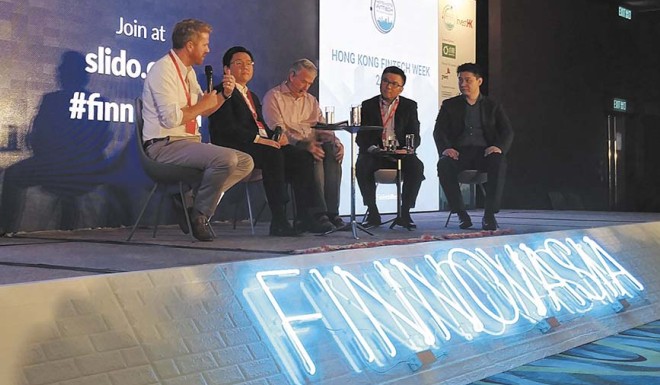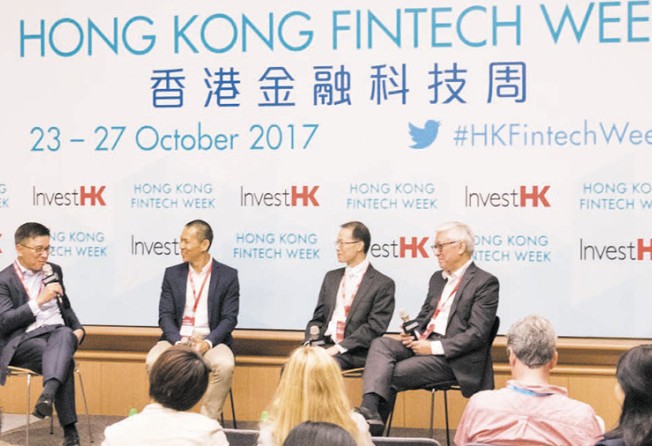
Big Data’s Human Element

[Sponsored Article]
The Hong Kong Fintech Week was staged at the Hong Kong Convention and Exhibition Centre, and saw HKUST faculty engaging in lively discussions with senior executives and business leaders on the digital future of the financial services industry.
Trading on smart data
The audience heard three important talks on related themes. First, Professor Mike So, from the Business School’s Department of Information Systems, Business Statistics & Operations Management, spoke on the “Use of Smart Data in High Frequency Finance and Risk Management”.
He began by describing how high-frequency stock trading works. “Once there is a profitable signal from the market, an algorithm is used by high-speed computers to perform trades.” The factors determining the efficiency of this process include network speed, the processing speed of the algorithm, the distance between the computers, and the location where trading takes place.
However, Professor So noted, high-frequency trading can be a double-edged sword. It can promote liquidity and reduce volatility in the market, but also increase the latter. Therefore, it is important to use technology to capture the connection between the movements of different stocks. “These co-movements can be quantified to help us quantify risk,” he said.
Man versus machine
The next speaker, Professor Allen Huang, also from the School’s Department of Accounting, addressed the subject of “The Value of Human Judgment”.
He explained how, when working in investment banking, he had used machines and algorithms to automate investment processes. This involved incorporating different sources of data, analyzing the information, giving a weighting to different types of securities, and managing the portfolio risk.
“We found that, even in this day and age, we needed some sort of human judgment in the process,” he said, before citing his subsequent academic research on the relative performance of equity analysts and computers. “We find that, consistently, no matter which algorithm you use, humans tend to outperform machines in certain tasks. For example, their earnings forecasts tend to be more accurate, on average.”
The human edge comes from the ability to access qualitative rather than quantitative information, he noted.
Big banks and big data
The final speaker was Dr Frank Tong, Global Head of Innovation and Strategic Investments with HSBC. His responsibilities cover the bank’s investments in start-ups and he focused on the growing impact of FinTech.
“Right now, every bank is a high-tech company,” he said. “HSBC sponsors the development of all sorts of new technologies, such as blockchain, quantum computing and IoT.”
He added that banks possess a wealth of data from both individuals and organizations, and the effective use of this data is becoming increasingly important. “Big data and artificial intelligence go hand in hand. Big data can be applied to anti-money laundering, to ‘know your client’, to assess credit ratings, and to predict which financial products will appeal to customers.”
Don’t count people out
The three speakers then took part in a panel discussion examining the impact of big data, smart data and the value of human judgment. As moderator, Adjunct Professor of Finance KC Chan asked if it was possible to just throw qualitative data at machines and let them use so-called deep learning to interpret it.
According to Professor Huang, it wasn’t that easy. “Because it’s coming from humans, the data tends to be very unstructured, and you have to clean it before using it,” he said.
Professor So agreed that data quality is even more important than the volume of data. He explained that the issue centered on valuable information that could take the form of conversations, facial expressions, images and the like. “But even now it’s very difficult for us to quantify everything. Maybe in a few years AI will be able to play an important role in this regard.”
As for the operations of traditional banks, Dr Tong explained that recent developments in technology were more likely to complement than disrupt the finance industry. “Banks are beginning to acquire these new technology companies,” he said.
He added that when assessing such start-ups, you could not judge them solely on the basis of a business plan, since this would inevitably evolve to reflect changing circumstances. Once again it came down to the human element.
“In the end, you look at the team, the people,” Dr Tong said.
